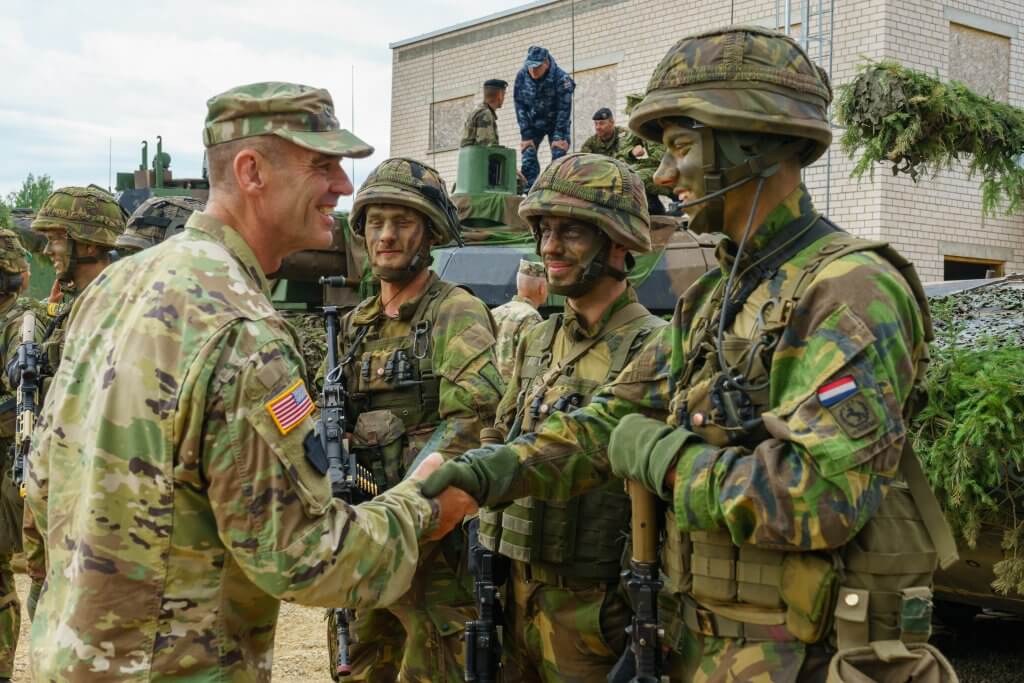After more than 40 years in the U.S. Army — both on active duty and with the Pennsylvania National Guard — I often remember the time I served in a former Soviet republic, just several years after the country regained its independence. My experience there has shaped my opinion on why it is important for the United States to remain a global leader. America has truly been a beacon of liberty shining throughout the world — and “beacon of liberty” is not a bumper sticker. For many, it is reality.
The Pennsylvania National Guard became a partner with Lithuania in 1993 through the State Partnership Program (SPP) that the U.S. European Command developed. In 2000 I was asked to go to Vilnius, Lithuania for a year to serve as the Military Liaison Team Chief. In this role, I was to lead American military personnel and several Lithuanians who were members of my team. Our mission was to provide information to the Lithuanian military about the way the U.S. military operated across all services and components in the areas of operations, intelligence, command and control, logistics, communications, and training management.
In the course of my duties, I traveled throughout the country of Lithuania visiting its military installations, speaking to commanders and other military leaders along with the common Lithuanian soldier. I was visiting a Lithuanian Army unit in a remote location in northern Lithuania, not too far from the border with Latvia, when a Lithuanian commander asked if I would like to visit a marketplace in the nearby village. This lieutenant colonel spoke particularly good English and offered to be my interpreter if I wanted to speak to any of the local citizens. I agreed.
We were both in our military field uniforms. As we strolled through the market, a crowd began to gather around us. A lady dressed in a long winter coat with a scarf over her head approached us. She appeared to be in her seventies. She began to point at me, and she became very excited. I thought she was agitated and angry with me as she raised her voice and continued to point at me.
I turned to the Lithuanian lieutenant colonel and asked if I did something wrong. I thought perhaps, I inadvertently violated a cultural norm or I inadvertently did something to upset her. The lieutenant colonel smiled at me and then he began to gesture to the lady to calm her down. He then said to me, “Sir, let me translate. This lady is telling everyone that as a young girl she grew up under Soviet occupation. Her parents hated the oppression they suffered. Her parents always told her to stay hopeful. One day they believed Lithuania would be a free country again. Her parents went on to tell this lady that she would know that Lithuania was a free and independent country the day she would see an American soldier standing firmly on Lithuanian soil.”
The lieutenant colonel then continued, “Sir, this is a remote village. Since we recently regained our independence, this is the first time this lady has seen a soldier in an American military uniform. She is telling her neighbors that by seeing you, she knows that Lithuania is finally a free country.”
That incident really brought home to me how much eastern European countries value freedom and appreciate the friendship and support of the United States of America. This incident also clearly demonstrates the role the U.S. military plays in providing free people throughout the world a sense of security.
According to the National Guard’s website, the SPP has been successfully building relationships for over 25 years and now includes 78 partnerships with 84 nations around the globe. SPP links a unique component of the Department of Defense — a state’s National Guard — with the armed forces or equivalent of a partner country in a cooperative, mutually beneficial relationship.
The SPP evolved from a 1991 U.S. European Command decision to set up the Joint Contact Team Program in the Baltic Region with reserve component Soldiers and Airmen. A subsequent National Guard Bureau proposal paired U.S. states with three nations emerging from the former Soviet Bloc and the SPP was born, becoming a key U.S. security cooperation tool, facilitating cooperation across all aspects of international civil-military affairs and encouraging people-to-people ties at the state level.”
Read: Gen. Lengyel talks about the bureau’s State Partnership Program
This cost-effective program is administered by the National Guard Bureau, guided by State Department foreign policy goals, and executed by the state adjutants general in support of combatant commander and U.S. Chief of Mission security cooperation objectives and Department of Defense policy goals.
Through SPP, the National Guard conducts military-to-military engagements in support of defense security goals but also leverages whole-of-society relationships and capabilities to facilitate broader interagency and corollary engagements spanning military, government, economic and social spheres.
There are 22 countries in Europe that are now part of the SPP. The last three years of my Army career brought me back to Europe. Between 2016 and 2019 I served on active duty as one of the Deputy Commanding Generals at U.S. Army Europe (USAREUR). During those three years in Europe, I traveled to at least 40 different countries in the USAREUR area of responsibility, some multiple times and most were former Soviet republics, former Warsaw Pact countries, and countries in the western Balkans. What I found was that every military and civilian leader from countries that had a SPP relationship deeply valued that relationship. The SPP is also valued by the U.S. ambassadors from those countries along with military leaders from the U.S. European Command and USAREUR.

